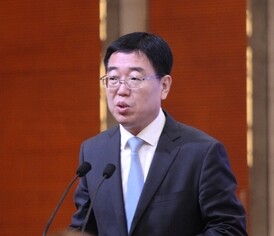hankyoreh
Links to other country sites 다른 나라 사이트 링크
Senior Chinese official says THAAD-related ban on tours to South Korea to continue

With the number of Chinese tourists to South Korea in sharp decline because of the dispute over the THAAD missile defense system, a senior Chinese official in the area of travel and tourism has stated that this trend will continue for the time being.
On the morning of May 26, Du Jiang, vice chairman of the China National Tourism Administration (a vice minister level official), delivered the opening address at an event in Sanmenxia, a city in Henan Province, promoting tourism in nine provinces along the Yellow River. While Du was leaving the event after his speech, a Hankyoreh reporter asked him whether the problems with South Korean tourism could be resolved. “You have to look at the governments of the two countries. Isn’t the cause quite clear?” Du said in response. “The one who tied the bell on [the tiger] has to take it off. So to resolve this problem, we have to start by finding a solution to the root cause,” he added, quoting a Chinese proverb.
While it has been reported that the China National Tourism Administration secretly ordered local governments and travel agencies around the country to restrict tourism to South Korea, this was the first time that that position was confirmed directly by a senior official. When Du was asked whether it was fair to say that the Chinese government is imposing sanctions, Du only said that “I spoke plainly just now.” The mention of intergovernmental problems could have been strongly hinting at the possibility of government-led sanctions. These remarks stand in contrast to speculation in some quarters that the conflict over THAAD is calming down.
Du’s response is in fact similar to remarks made by Chinese Foreign Minister Wang Yi on May 22 during a visit to Cote d'Ivoire, when he said that “Whoever tied the bell on the tiger shall take it off.” Wang said this while referring to the South Korean special delegation led by Lee Hae-chan that visited China last week. “We hope that South Korea will take advantage of the positive interaction during the special envoy’s visit to take practical measures to remove the thorn in the throat of bilateral relations as soon as possible,” Wang said. He was ultimately calling on South Korea to make an effort to resolve the THAAD issue, and the fact that his remarks were repeated by the China National Tourism Administration indicates that this has become established as the Chinese government’s position.
While some reports have indicated that China has been relaxing its retaliatory measures against THAAD since the inauguration of South Korean President Moon Jae-in, sources say that in fact there have not yet been any noticeable changes. “We’re still not receiving any applications for Chinese group visas, and we aren’t seeing any new activity. Just in terms of the Beijing Embassy, applications for individual visas dropped to about 200 in the fourth week of March but are hovering around 400 these days. Considering that there used to be around 800 to 1,000 such applications, it would be hard to say we’re seeing meaningful change just yet,” said a source at South Korea’s Embassy to Beijing.
By Kim Oi-hyun, Beijing correspondent in Sanmenxia
Please direct questions or comments to [english@hani.co.kr]

Editorial・opinion
![[Column] Park Geun-hye déjà vu in Yoon Suk-yeol [Column] Park Geun-hye déjà vu in Yoon Suk-yeol](https://flexible.img.hani.co.kr/flexible/normal/500/300/imgdb/original/2024/0424/651713945113788.jpg) [Column] Park Geun-hye déjà vu in Yoon Suk-yeol
[Column] Park Geun-hye déjà vu in Yoon Suk-yeol![[Editorial] New weight of N. Korea’s nuclear threats makes dialogue all the more urgent [Editorial] New weight of N. Korea’s nuclear threats makes dialogue all the more urgent](https://flexible.img.hani.co.kr/flexible/normal/500/300/imgdb/original/2024/0424/7317139454662664.jpg) [Editorial] New weight of N. Korea’s nuclear threats makes dialogue all the more urgent
[Editorial] New weight of N. Korea’s nuclear threats makes dialogue all the more urgent- [Guest essay] The real reason Korea’s new right wants to dub Rhee a founding father
- [Column] ‘Choson’: Is it time we start referring to N. Korea in its own terms?
- [Editorial] Japan’s rewriting of history with Korea has gone too far
- [Column] The president’s questionable capacity for dialogue
- [Column] Are chaebol firms just pizza pies for families to divvy up as they please?
- [Column] Has Korea, too, crossed the Rubicon on China?
- [Correspondent’s column] In Japan’s alliance with US, echoes of its past alliances with UK
- [Editorial] Does Yoon think the Korean public is wrong?
Most viewed articles
- 1‘We must say no’: Seoul defense chief on Korean, USFK involvement in hypothetical Taiwan crisis
- 2N. Korean delegation’s trip to Iran shows how Pyongyang is leveraging ties with Moscow
- 346% of cases of violence against women in Korea perpetrated by intimate partner, study finds
- 4[Column] Park Geun-hye déjà vu in Yoon Suk-yeol
- 5‘Weddingflation’ breaks the bank for Korean couples-to-be
- 6Will NewJeans end up collateral damage in internal feud at K-pop juggernaut Hybe?
- 7Amnesty notes ‘erosion’ of freedom of expression in Korea in annual human rights report
- 8[Interview] Dear Korean men, It’s OK to admit you’re not always strong
- 9Korean government’s compromise plan for medical reform swiftly rejected by doctors
- 10[Editorial] Japan’s rewriting of history with Korea has gone too far